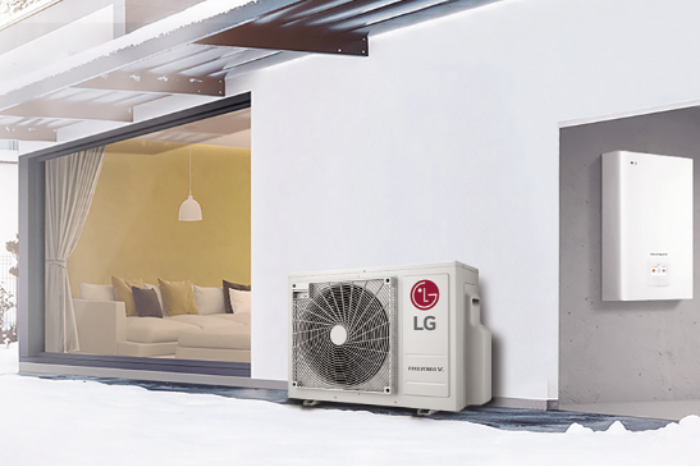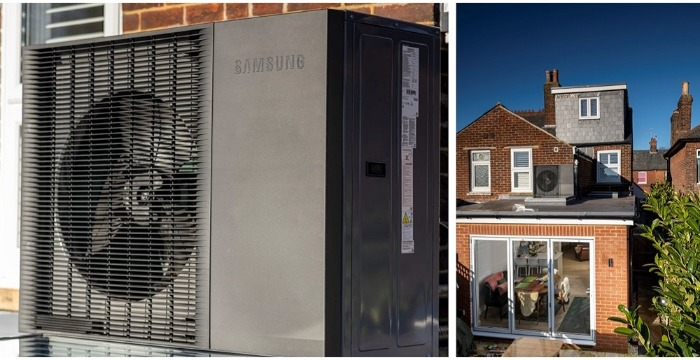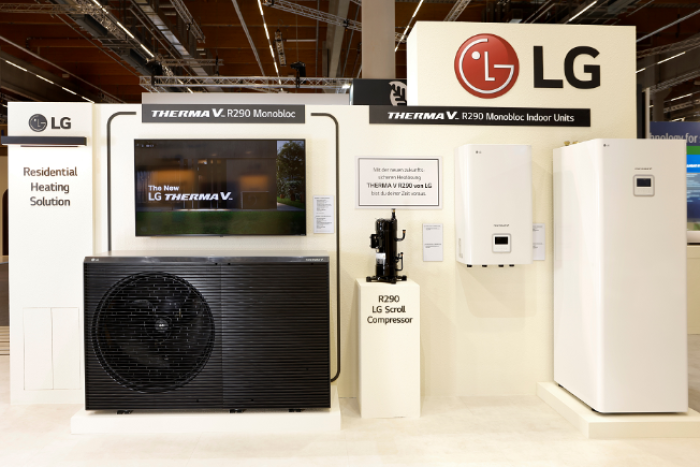Tech, Media & Telecom
LG, Samsung vie for HVAC lead with green technology
The global HVAC market is forecast to grow by more than 75% from 2020 to 2030, according to MarketsandMarkets
By Aug 06, 2023 (Gmt+09:00)
3
Min read
Most Read
LG Chem to sell water filter business to Glenwood PE for $692 million


Kyobo Life poised to buy Japan’s SBI Group-owned savings bank


KT&G eyes overseas M&A after rejecting activist fund's offer


StockX in merger talks with Naver’s online reseller Kream


Mirae Asset to be named Korea Post’s core real estate fund operator



South Korea’s long-time technology archrivals LG Electronics Inc. and Samsung Electronics Co. are upping the ante in the race to lead the growing global heating ventilation air conditioning (HVAC) market with environmentally friendly technologies.
LG Electronics has recently vowed to further advance its HVAC business as one of its core business-to-business (B2B) growth drivers.
B2B is one of its next growth engines expected to lead LG Electronics’ transformation into a platform-based service provider from a traditional home appliance company, according to the company.
Under the new business goal, LG Electronics aims to double sales for its HVAC systems with more focus on North America and Europe, which together account for 37% of the global HVAC market.
HVAC refers to the systems that regulate and move heated and cooled air throughout buildings.
LG Electronics plans to roll out highly localized HVAC products through local research and development teams, production facilities and distribution networks across the world.
Its long-time rival Samsung Electronics has also thrown down the gauntlet with its eco-friendly heat pump solutions.

Korea’s two electronics behemoths are ratcheting up efforts to boost their presence in the global HVAC market as it is expected to expand rapidly in the coming decade.
According to global industry research firm MarketsandMarkets, the international HVAC market is forecast to grow to $358 billion in 2030 from $202 billion in 2020.
INVERTER HEAT PUMP TECHNOLOGY IN THE LIMELIGHT
To take the lead in the market, LG and Samsung are focusing on eco-friendly HVAC technologies amid the world’s target of net-zero carbon emissions by 2050.
Armed with its leading inverter heat pump technology, LG Electronics is hoping to distance itself from its rivals in the HVAC system market.
Inverter technology is energy-saving technology that regulates motor speed to eliminate wasted operation in air cooling and heating.
“Electric heating systems are growing in importance amid ongoing moves to replace oil and gas with electrical energy,” LG Electronics' Chief Executive Cho Joo-wan said last month when he unveiled the company’s new vision as a platform company. “LG Electronics equips its residential and commercial air conditioning systems with its highly efficient inverter technology.”
Its mainstay HVAC system brand is Therma V.
The company unveiled new Therma V R290 Monobloc and Therma VR32 Split 4 & 6 kilowatt (KW) air source heat pumps at ISH 2023, the world’s leading HVAC trade show in the UK in March.

The Therma V R290 especially uses R290 refrigerant boasting exceptionally low-Global Warming Potential (GWP), one of the key requirements to meet Europe’s new refrigerant regulations set to come into force in 2025.
The LG Therma V compresses air from outdoors to make the indoor air warmer, using a heat exchanger. The company says the system that runs on a combination of 25% electricity and 75% outside air emits much less carbon dioxide than other systems.
Samsung Electronics also markets heat pump technology-based HVAC systems under the Eco Heating System (EHS) brand.
It also introduced the EHS Mono R290 at this year’s ISH along with other green technology-powered heat pump solutions.
The EHS Mono R290 is Samsung Electronics’ first heat pump solution to use the natural refrigerant R290 with a much lower GWP.
R290 is a highly pure propane that poses nearly no risk to the ozone layer and is considered more eco-friendly than any conventional refrigerant.
The Samsung EHS Mono R290 can replace ordinary boilers not only to warm and cool air but also to heat water, according to the company.
Write to Ye-Rin Choi at rambutan@hankyung.com
Sookyung Seo edited this article.
More to Read
-
 ElectronicsLG makes big B2B push to regain momentum, boost profits: CEO
ElectronicsLG makes big B2B push to regain momentum, boost profits: CEOFeb 08, 2023 (Gmt+09:00)
2 Min read -
 EnergySamsung Elec's green heat pump takes energy-starved Europe by storm
EnergySamsung Elec's green heat pump takes energy-starved Europe by stormDec 20, 2022 (Gmt+09:00)
2 Min read
Comment 0
LOG IN


